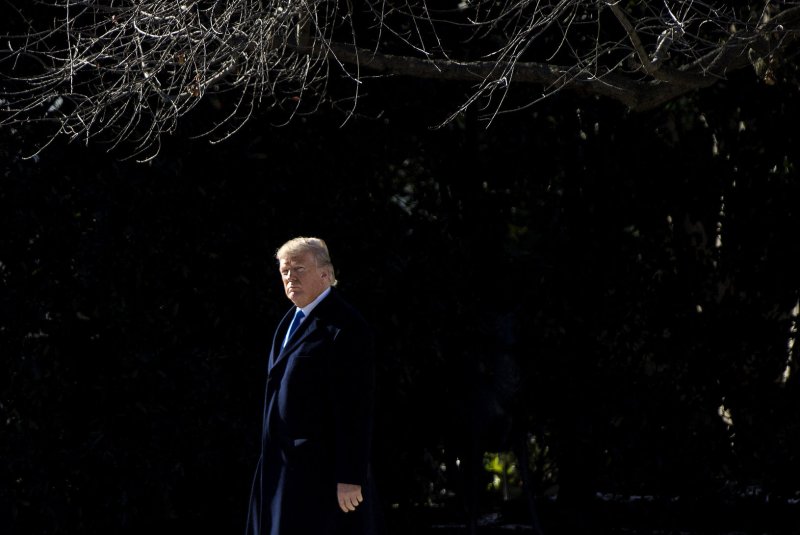By James LaPorta
The statement follows suspension of delivery of security funds and military equipment based on U.S. officials lack of satisfaction with Pakistani leaders' efforts against terror groups.President Donald Trump departs the White House on January 5, 2018 for a weekend trip to Camp David where he will met with Republican leadership. Jan. 9 (UPI) -- The Pentagon has clarified what the United States expects of Pakistan after suspending the delivery of security funds and military equipment, and what needs to happen for delivery of both to start back up.
The Pentagon's top press officer told reporters Monday that the United States wants Pakistan to take "decisive action" against terrorism within the region following the suspension of security funds and military equipment to the Pakistani government -- a decision that drew harsh backlash last week from the U.S. ally.
"Our expectations are straightforward: Taliban and Haqqani leadership and attack planners should no longer be able to find safe haven or conduct operations from Pakistani soil," said Army Col. Robert Manning, who is the director of defense press operations at the Pentagon.
"This suspension is not a permanent cutoff at this time," Manning said. "Security funding and pending deliveries will be frozen, but not cancelled or reprogrammed at this time."
Manning said that the U.S. stands ready to "work together" with Pakistan, and that, "the U.S has conveyed to Pakistan specific and concrete steps that it could take toward these ends," adding, "We stand ready to work together with Pakistan to combat terrorist groups without distinction."
Military and security funds being cut off to Pakistan for their alleged harboring of terrorists from the Haqqani network -- one of the most dangerous insurgent groups in Afghanistan -- comes after months of President Donald Trump accusing Islamabad of maintaining close relationships with the Afghan Taliban.
Historically, Pakistan has faced the same type of criticism before regarding its counterterrorism efforts and providing of "safe havens" to terrorists from the past two White House administrations, with the Pakistani government staunchly refusing to ramp up their operational tempo when accused of aiding the Taliban's efforts.
Pakistan's response last week, however, was more tempered than previous official statements to past accusations.
Pakistan issued a statement on Friday that said, "We are engaged with the US Administration on the issue of security cooperation and await further details."
"[It] needs to be appreciated that Pakistan has fought the war against terrorism largely from its own resources, which has cost over $120 billion in 15 years," Pakistan said in a statement on Friday, which noted that counter terrorism efforts between the two countries has "decimated al-Qaeda" and other groups, directly serving the national security interests of the U.S. and the international community.
"Arbitrary deadlines, unilateral pronouncements and shifting goalposts are counterproductive in addressing common threats," the Pakistani leaders added.
The current U.S.-Pakistan feud first kicked off after Trump first took office, when he called out Islamabad in August 2017 during the announced of a new strategy for Afghanistan that called for an increase in troop levels, saying Washington could "no longer be silent about Pakistan's safe havens for terrorist organizations."
"We have been paying Pakistan billions and billions of dollars, at the same time, they are housing the very terrorists we are fighting...that must change immediately," said Trump.
Last week's announcement that $900 million for Pakistan in Coalition Support Funds would be frozen came just days after Trump tweeted criticismof the U.S. for "foolishly" giving military aid to Pakistan despite the country giving "save haven" to terrorists at the start of the New Year.
The State Department said that Pakistan was being placed on a "special watch list" for its treatment of religious minorities, and that all military equipment deliveries would stop.
On Friday, Defense Secretary James Mattis said the U.S. has "had disagreements, strong disagreements on some issues, and we're working those. The specific individual things we're doing are best handled in private, to ensure that we can be most productive -- and that's what we're working now."

No comments:
Post a Comment